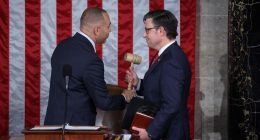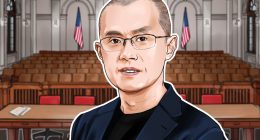
When I was first writing the pilot for Severance, I was working at a company that makes doors. It was a very mindless job: cataloging all the different parts of doors. There’s nothing terribly unique or interesting in saying that I didn’t like my job — even people who are doing something they love might find themselves on a day-to-day basis feeling like whatever they’re doing is just a grind. But my job became so mind-numbing that I had the fantasy that would become the premise of the show. What if I could skip the eight hours of the workday, to disassociate and just get it over with?
I joke that the Great Resignation — the phenomenon in which 47 million Americans quit their jobs in 2021 alone — was my idea, but in reality a lot of things were happening at the same time we were making Severance. The pandemic forced people to reassess the necessity of a lot of things in their lives, to question in particular all the conventions that we have associated with having a job. Some people could do their jobs just as well by checking their email a couple of times a day without going into an office. There is no actual practical reason to give half of a waking day to a job when one can be as productive at home without making that sort of puritanical sacrifice.
But the pandemic tipped the balance more toward work, in a way. When you can work from home, you no longer have the separation of going into an office. I think a lot of employers saw that and took advantage of it: “We have your cellphone, we have your email — we can reach you at any time, anywhere.” It’s become harder and more necessary to guard the life side of the work-life balance. We do our jobs ostensibly pretty close to where we sleep. It’s something that’s happened slowly, and the elements that led to the Great Resignation and this new conversation about work and life and happiness definitely influenced Severance at every stage. What we were building coincided with what was coming to a head in the real world.
When Britt Lower’s Helly joins the Microdata Refinement team at Lumon Industries at the beginning of the show, her fellow “innies” are intentionally workplace tropes. There’s John Turturro’s Irving, a stodgy company man who believes heart and soul in what he’s doing at work. Zach Cherry’s Dylan is a callous overachiever, yet competitive and snarky. Mark, played by Adam Scott, is the lovable goofball, sort of the middle child in the family trying to hold everyone together. I had a job once where a group of us sat at a little desk island similar to the one on the show. Like Tramell Tillman’s Mr. Milchick, our boss would come in and it was as if we were at a comedy show — he would spur playful banter that became part of the office culture, and it kept us working and kept us happy.
I’m not saying there was an insidiousness behind that particular man or that particular company, but I did start to feel that there was a very narrow space for our personal lives at work. Our employer encouraged that little banter to keep us satisfied and feeling human — but it can’t grow beyond that before it becomes a problem. That plays out over the course of Severance‘s first season, in which these characters who are reductive versions of their real selves start to figure out who they actually are and begin to act authentically in a way that’s problematic to the company.
We intentionally set the many departments in Lumon far away from one another. There are weird ways in which distrust is seeded among them, which was a mutated version of the real experiences I had when I was working in an office. That same outgoing manager took me to lunch once to discuss my pay raise — which came to an insubstantial amount, a $7 increase per day — and he told me how someone in another department was whining about his paltry raise. He advised me, “Don’t be the guy who asks around about everybody’s raises.” He made it seem like I would be the asshole for asking questions. People may have good intentions, but when you’re made to feel like you’re part of a family to prevent you from asking for more money, then it becomes more personal.
I also did a lot of research into cults, which most people define as toxic organizations that take advantage of people. But there’s a spectrum — the tactics used in cults can be found in numerous organized religions and in corporations. In Severance, there’s a cult of personality around Lumon founder Kier Eagan, a messianic figure who “revolutionized” the company to change the world for the better.
We define ourselves by our jobs, and something that is baked into the show is the idea that the “outies” — who the characters are when they’re not at Lumon — feel lost to some extent. Mark, in particular, is rudderless; he went through the severance procedure to help him grieve the death of his wife, but he almost feels like a nonentity — he doesn’t know where to start moving past that grief. He doesn’t have a complete sense of who he is. We are so conditioned to identify as the person who does a particular job all day, but Mark can’t do that anymore. He’s a kind of ghost walking around in the real world without much to talk about or say.
Finding purpose in our work and our contributions to society is baked into us, and probably can’t be baked out. That quality is exploited a lot, and we are often pulled into being completely identified by our jobs more than we would be naturally. This affects us in the film and television industry just as much as it does the average office worker in corporate America: Crewmembers often work 12-hour days, which makes the set an unsafe work environment. Part of the culture is that there’s an expectation that your love for film or television and your gratitude to be on set make certain labor conditions an understandable part of the job. The industry is not exempt from those cult-like statements and tactics that we were exploring on Severance.
I guarantee you that everyone who watches our show is more interesting than their job descriptions, maybe even in ways they themselves have forgotten. Whatever the job you’ve picked and decided you wanted — if you were so lucky to have had a choice — can be a wonderful experience, but sometimes we lose sight of the notion that there’s more to us than what we do for a living. It’s easy to say but hard to do. But it’s important to remind ourselves every now and then that we’re humans first, workers second.
This story first appeared in a June stand-alone issue of The Hollywood Reporter magazine. To receive the magazine, click here to subscribe.
Source: Hollywood







